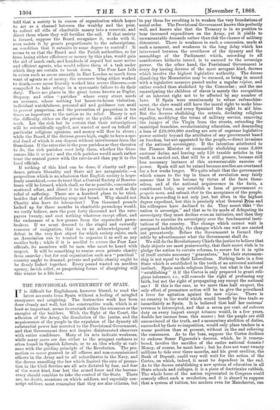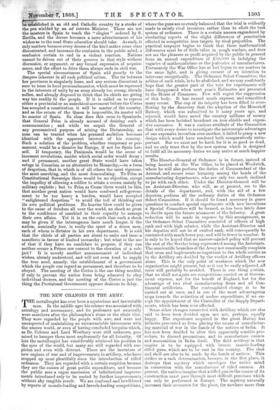THE PROVISIONAL GOVERNMENT OF SPAIN.
IT is difficult for Englishmen, however liberal, to read the latest accounts from Spain without a feeling of mingled annoyance and misgiving. The destructive work has been done cleanly and well, but the constructive work, which is at least as important, seems to overtask either the resources or the energies of the builders. With the flight of the Court, the adhesion of the Army, the dissolution of the juntas, and the acquiescence of the people in the expulsion of the dynasty all substantial power has accreted to the Provisional Government, and that Government does not inspire disinterested observers with entire confidence. Many of its acts indicate weakness, while many more are due either to the arrogant rashness so often found in Spanish Liberals, or to an idea wholly at vari- ance with the guiding principle of the Revolution. The pro- motion en masse granted to all officers and non-commissioned officers in the Army and to all subordinates in the Navy, and the decree annulling the law which limited the rate of promo- tion in the Civil Service are all acts dictated by fear, and fear of the worst kind, fear lest the armed force and the bureau- cracy should combine to take the control of the State. There are, no doubt, occasions on which soldiers, and especially con- script soldiers, must remember that they are also citizens, but to pay them for revolting is to weaken the very foundations of social order. The Provisional Government knows this perfectly well, and knows also that the Treasury is in no position to bear increased expenditure on the Army, yet it yields to unwarrantable demands rather than risk the chance of military discontent. There is weakness in such a concession, made at such a moment, and weakness in the long delay which has intervened between the overthrow of the dynasty and the assemblage of the Parliament which, according to all manifestoes hitherto issued, is to succeed to the sovereign power. On the other hand, the Provisional Government is every day issuing decrees of the most arrogant kind, decrees which involve the highest legislative authority. The decree dissolving the Monasteries may be excused, as being in accord with a legislative measure passed under a regular re'gime, and rather evaded than abolished by the Concordat ; and the one emancipating the children of slaves is merely the recognition of an inherent right not to be affected by any number of laws. If Spain were unanimously to refuse enfranchise- ment, the slave would still have the moral right to make him- self free by force, and every Spaniard the right to aid him. But the decrees abolishing the octrois, declaring religious equality, modifying the terms of military service, removing the images of the Virgin from the streets, extending the municipal franchise, revolutionizing education, and demanding a loan of £20,000,000 sterling are acts of supreme legislative power entirely beyond the attributes of any government based on freedom, but not appointed by the people,—direct invasions of the national sovereignty. If the intention attributed to the Finance Minister of summarily abolishing some 2,000 customs' duties, and leaving only 150 taxable articles in the tariff, is carried out, that will be a still grosser, because still less necessary instance of this unwarrantable exercise of power. Spain will not be ruined because needles are overtaxed for a few weeks longer. We quite admit that the government which comes to the top in times of revolution may fairly assume that it has become by virtue of the facts them- selves, ani of the national acquiescence in the facts, a constituent body, may establish a form of government ex proprio motu, and submit that to the acceptance of the people. Such a proceeding is not only just, but often in the highest degree expedient, but this is precisely what General Brim and his colleagues have declined to do. They assert that "the nation is sovereign," and that as to its mode of delegating its sovereignty they must decline even an initiative, and then they assume to exercise its sovereignty over the fundamental insti- tutions of the country. The change which cannot wait is postponed indefinitely, the changes which can wait are carried out prematurely. Before the Government is formed they settle by advertisement what the Government shall do.
We will do the Revolutionary Chiefs the justice to believe that their objects are most praiseworthy, that their secret wish is to pledge the nation to certain reforms, to secure for it in spite of itself certain necessary "guarantees," but their statesman- ship is not equal to their Liberalism. Nothing lasts in a free State which is established in the teeth of an universal national instinct. Spain needs religious liberty, but what is the use of "establishing" it if the Cortes is only prepared to grant reli- gious tolerance, i.e., will concede the right of professing any faith, but not the right of propagating any except the national one? If this is the case, as we more than half suspect, the only effect of premature action will be to give the priesthood a lever for agitation against the new regime. There is no country in the world which would benefit by free trade so immediately as Spain. It is believed that half her customs' revenue is intercepted, and that a seven per cent, ad valorem duty on every import except tobacco would, in a few years, double her income from this source ; but the people are still unconvinced of the truth, and a momentary abolition of duties, succeeded by their re-imposition, would only place traders in a worse position than at present, without in the end relieving the consumers. As to the loan, suppose the Cortes declines to endorse Senor Figuerola's decrees, which, be it remem- bered, involve the sacrifice of the entire national domain? Money, of course, he must have ; but he does not want twenty millions to tide over three months, and his great creditor, the Bank of Deposit, could very well wait for the action of the Cortes, on which, indeed, it must be dependent in the end. As to the decree establishing a new system of education in all State schools and colleges, it is a piece of doctrinaire rubbish. The whole force of the nation represented in Congress could scarcely effect such a revolution, and it is absurd to suppose that a system of tuition, too modern even for Manchester, can
tirablithed in an old and Catholic country by a stroke of
the pen wielded by an ad interim Minister. There are not the masters in Spain to teach the " ologies " ordered by S. Zorilla, and the decree becomes a mere advertisement of his .wishes as to the road State education should take. As such, it only matters because every decree of the kind makes some class discontented, and increases the confusion in the public mind, a confusion certain to end in a violent reaction. Nations cannot be driven out of their grooves in that style without discussion, or argument, or any formal expression of acquies- cence, and the effort to drive them always ends in civil war.
The special circumstances of Spain add greatly to the dangers inherent in all rash political action. The tie between her provinces is singularly loose, and any serious discontent is sure to issue in local pronunciamentos, which must be repressed in the interests of unity by an army already too strong, already sullen, and already disposed to think that its chiefs are giving way too readily tO the people. If it is called on to repress either a provincial or an anarchical movement before the Cortes has accepted a constitution it will: be master of the country, and as the return of the Queen is impossible, its master will be master of Spain. So clear does this seem to Spaniards, that General Prim is already accused of desiring such a consummation ; and while we acquit the General of any preconceived purpose of seizing the Dictatorship, no man can be trusted when his .personal ambition becomes identical with the apparent interest of his country. Such a solution of the problem, whether temporary or per- manent, would be a disaster for Europe, if not for Spain her- self. If temporary, the Peninsula would be the scene of incessant revolutions, amidst which social order would decay ; and if permanent, another great State would have taken refuge in Caasarism as an alternative to Monarchy,—in a form • of despotism, that is, which is of all others the most vigorous, the most searching, and the most demoralizing. To Prim as Constitutional Sovereign there would be no objection, except the impolicy of allowing a soldier to attain a crown mainly by military exploits ; but to Prim as Cwsar there would be this, that another great nation would have confessed self-govern- ment to be too heavy a burden, would have accepted "enlightened despotism" to avoid the toil of thinking out its own political problems. No heavier blow could be given to the cause of freedom all over the world, no shock so great to the confidence of mankind in their capacity to manage their own affairs. Yet it is on the cards that such a shock may be given if the interregnum lasts much longer, if the nation, nominally free, is really the sport of a dozen men, 'each of whom is dictator in his own department. It is said that the chiefs of all parties are about to unite and issue a manifesto in favour of limited monarchy ; but what is the use of that if they have no candidate to propose, if they can neither secure a Prince nor consent to the elevation of a sub- ject? It is merely another announcement of individual wishes, already understood, and will not even tend to supply the true need, namely, the establishment of a government which the people can regard as permanent, and therefore to be obeyed. The meeting of the Cortes is the one thing needful, if only to prevent the nation from being educated to obey individual decrees, and the meeting of the Cortes is just the thing the Provisional Government appears desirous to delay.































 Previous page
Previous page